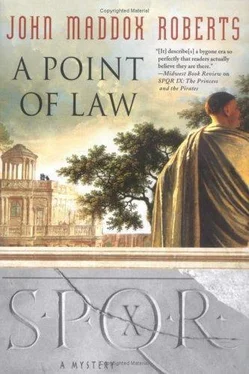John Roberts - A Point of Law
Здесь есть возможность читать онлайн «John Roberts - A Point of Law» весь текст электронной книги совершенно бесплатно (целиком полную версию без сокращений). В некоторых случаях можно слушать аудио, скачать через торрент в формате fb2 и присутствует краткое содержание. Год выпуска: 0101, ISBN: 0101, Издательство: St. Martin, Жанр: Исторический детектив, на английском языке. Описание произведения, (предисловие) а так же отзывы посетителей доступны на портале библиотеки ЛибКат.
- Название:A Point of Law
- Автор:
- Издательство:St. Martin
- Жанр:
- Год:0101
- ISBN:9780312337254
- Рейтинг книги:5 / 5. Голосов: 1
-
Избранное:Добавить в избранное
- Отзывы:
-
Ваша оценка:
- 100
- 1
- 2
- 3
- 4
- 5
A Point of Law: краткое содержание, описание и аннотация
Предлагаем к чтению аннотацию, описание, краткое содержание или предисловие (зависит от того, что написал сам автор книги «A Point of Law»). Если вы не нашли необходимую информацию о книге — напишите в комментариях, мы постараемся отыскать её.
A Point of Law — читать онлайн бесплатно полную книгу (весь текст) целиком
Ниже представлен текст книги, разбитый по страницам. Система сохранения места последней прочитанной страницы, позволяет с удобством читать онлайн бесплатно книгу «A Point of Law», без необходимости каждый раз заново искать на чём Вы остановились. Поставьте закладку, и сможете в любой момент перейти на страницу, на которой закончили чтение.
Интервал:
Закладка:
“Baiae is about midway between Rome and Croton,” Julia put in. “It’s a substantial trip in both directions.”
“The conspirators,” I said, “wanted a code. As I’ve mentioned, certain senators follow the teachings of Pythagoras-not these men, of course, but one of them might have heard of Aristobulus in conversation. Or, who knows, one of them might have spent some time in Croton and studied with the man and knew of his theories. In any case, they probably hired him to devise this cipher for them. For a good fee, he would have been happy to go up to Baiae to confer with them.”
“But why a ring from Croton?” Julia asked.
“This business is full of little anomalies. But I doubt that it’s a coincidence. There are no coincidences in a conspiracy.”
“That sounds like a quote from Euripides,” Callista said.
“I don’t cadge from Greek playwrights,” I told her. “What do you know about this man Aristobulus other than what you’ve already told us?”
“Virtually nothing. He’s quite obscure. He never taught at the Museum, or in the other schools of Alexandria, or I would have heard about it. I could make inquiries in the Greek community here.”
“No, please, there’s no time for that. I’ll talk with Asklepiodes. He travels all over Italy with Statilius’s troupe, and he loves to hobnob with the scholarly crowd wherever he goes. If he’s been to Croton he may know Aristobulus.”
“Excellent idea,” Julia said. “Why don’t you go along and do just that so that we can work on this code.”
I can take a hint.
I found Asklepiodes in the kitchen of the Statilian school. Supervising the diet of the gladiators was one of his duties. Satisfied that all was in order, he led me to his spacious surgery, a room so draped with weapons that it looked more like a Temple of Mars than a medical facility.
“More bodies to examine?” he asked me.
“Not this time. Do your travels ever take you to Croton?”
“Usually once each year. The city and its district are Greek, so there is not as much demand for gladiators as in Rome and Campania, but the city authorities sponsor a modest show each fall. What is your interest in Croton?”
“In your travels there, did you ever meet a mathematician named Aristobulus?”
His face, usually so maddeningly serene, showed genuine surprise. “Why, yes. Whenever I am in Croton, I attend the weekly dinner and symposium of the Greek Philosophical Club. Croton has a small but distinguished community of scholars, as you might expect of the home of Pythagoras. He was always there until-well, Croton is all the way down in Bruttium. How is it that you are investigating his case?”
Now it was my turn to look astonished. “His case? What do you mean?”
“He was murdered earlier this year. You mean you aren’t investigating? Since you always seem to be around wherever there is a murder, I supposed-”
“Murdered? I first heard of the man less than an hour ago, in connection with the case in which I am embroiled, and now you tell me he was murdered! How-”
Asklepiodes held up a hand for silence. “Let’s not confuse one another further.” He pointed to the chairs that flanked a table by a window. “Have a seat.” He clapped his hands and one of his silent Egyptians appeared. He said something incomprehensible to the man, then took the chair opposite mine. “I’ve sent him for some wine. My very best wine because I know you speak most easily with proper lubrication.”
“That is thoughtful of you, old friend.” I am sure I had that hammered look again. I do not object to things moving fast, but they shouldn’t move in so many directions. The wine came and it was, indeed, excellent.
While I sipped I looked out the window, which overlooked the training yard. About a hundred men were practicing noisily with sword and shield, some paired in the traditional way with a lightly armored man bearing a big shield fighting another who carried a small shield but wore more protective armor. But many were Gauls plying their national weapons: a long, narrow, oval shield and a long sword, with no armor at all except for a simple, pot-shaped helmet. Such men were appearing in the arenas in ever-greater numbers. It was easier to let them fight as they were accustomed to than to try to teach them to fight like civilized swordsmen.
As I pondered this sight and tried to calculate odds for the next big munera , I told Asklepiodes of the latest twists in my case. He listened with rapt attention and when I finished, he clapped his hands and chuckled as if he’d attended the cleverest comedy ever written by Aristophanes.
“I rejoice that someone is getting some amusement from my plight,” I said, with perhaps too much heat for one drinking my host’s excellent wine.
“But this is so splendid!” Asklepiodes said, not at all abashed. “Over the years you have investigated hundreds of murders”-a gross exaggeration, but he was a Greek-“and I have aided you in many of these. But this is the first to involve scholarship, mathematics, a cipher-it is all just wonderful! Now, let me tell you what I know.”
“Please do.” I helped myself to some more of his speech lubrication.
“Aristobulus-he didn’t call himself ‘of Croton’ at home since they are all from Croton there-”
“That is understood.”
“Aristobulus was a small man, advancing in years but not in fortune. He wore rather shabby clothes, but he tried to pretend that this was a virtue, as philosophers so often do. He was not argumentative, neither was he talkative. Rather, he was aloof, as if the company were unworthy of him. But I learned that he never passed up one of these weekly dinners, which were not paid for by subscription from the members of the club but by the testaments of wealthy members in times past.”
“I never knew a philosopher to turn down a free meal,” I said, nodding.
“Anyway, when the time came for the symposium after dinner, Aristobulus drank his share and more, and he grew more talkative. This often consisted of boasting about his discoveries in the mathematical field. He had some rather radical ideas, as the learned lady has tried, without success, to explain to you.”
“I never claimed to understand mathematics. When I had charge of the Treasury I had slaves and freedmen for that, fortunately.”
“He was never mocked by the rest of the company, but he was regarded with, shall we say, a healthy scepticism,” Asklepeodes commented. “The last time I attended that gathering but one was the last time I saw him alive-he was better-dressed.” He paused and took a sip, waiting for my reaction. Asklepiodes always did that.
“Well? What did this signify?” I was never good at restraining my impatience.
“He did not precisely boast, but he hinted heavily that he had acquired a patron, a highly placed person who understood the importance of his work. His clothes were not gaudy, you understand. He adhered to the principles of philosophical simplicity. But they were new and of excellent quality. And, for the first time since I had known him, he wore jewelry: a ring.” That maddening pause again.
“Ring! What sort of ring? Quit stalling!”
“There was a massive seal ring on the index finger of his right hand. Eumolpus the Cynic, a rather acerbic gentleman as you might gather from his appellation, took note of this new adornment and made comment that it contrasted oddly with Aristobulus’s customary, not to say flaunted, austerity. Aristobulus replied that it was a gift from his patron, that he used it as a seal on all his correspondence with this mysterious benefactor, and that he must wear it as a symbol of their mutual pledge.”
“Did you get a good look? Can you describe it?”
Читать дальшеИнтервал:
Закладка:
Похожие книги на «A Point of Law»
Представляем Вашему вниманию похожие книги на «A Point of Law» списком для выбора. Мы отобрали схожую по названию и смыслу литературу в надежде предоставить читателям больше вариантов отыскать новые, интересные, ещё непрочитанные произведения.
Обсуждение, отзывы о книге «A Point of Law» и просто собственные мнения читателей. Оставьте ваши комментарии, напишите, что Вы думаете о произведении, его смысле или главных героях. Укажите что конкретно понравилось, а что нет, и почему Вы так считаете.









